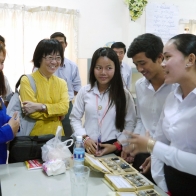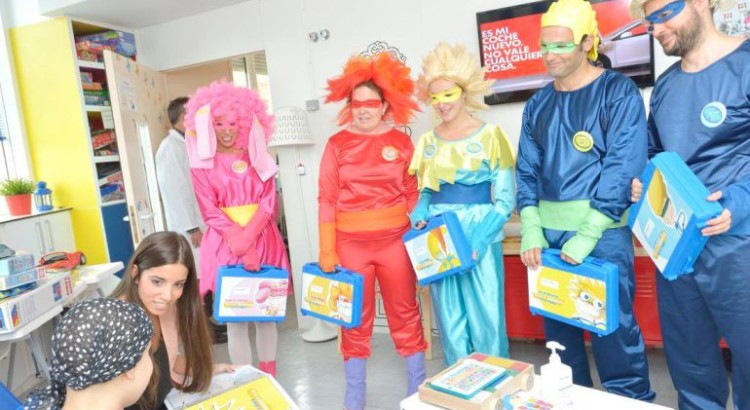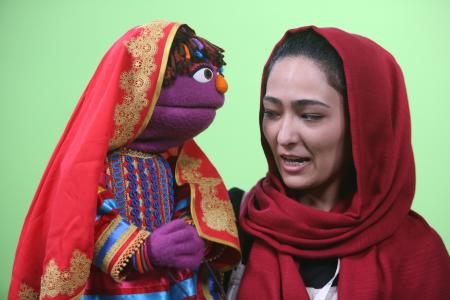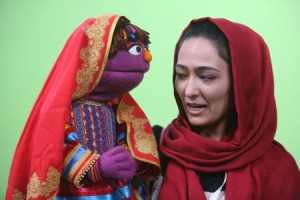Un juguete no solo puede alegrar a un niño ingresado en un hospital. También le pude ayudar a curarse: está demostrado que el estado de ánimo influye en las posibilidades de curación. Por ello es tan importante la labor de Juegaterapia, una ONG pionera que lleva consolas videojuegos a los niños enfermos de cáncer y ya está a punto de construir su tercer jardín en un hospital.
Diana García Bujarrabal / Qué.es 11/04/2016/En TuentiMenéame

La niña de la foto se llama Blanca. Cuenta Valle Sallés, directora general deJuegaterapia, que ahora está muy bien y tiene una melena larguísima. En el momento en el que tomaron la foto que ilustra este reportaje lo que estaba era feliz: acaban de inaugurar un jardín en la azotea del Hospital de la Paz, el mismo en el que la pequeña se encontraba en tratamiento oncológico.
El jardín del Hospital de la Paz, inaugurado en 2013 sobre los 700 metros cuadrados que ocupan la azotea del centro, fue el primer gran proyecto de Juegaterapia, una pequeña ONG que nació de forma casi casual en 2010. «Mónica tenía una PSP que no utilizaba. Otra amiga tenía un hijo con cáncer y decidió llevársela; él ya tenía, pero se la dejó al niño de la habitación de al lado, y cuando volvió al cabo de unos días el niño había cambiado totalmente«, cuenta Valles Sallés, sobre sus inicios junto con la presidenta de Juegaterapia, Mónica Esteban.
A partir de ese momento comenzaron a recoger consolas entre sus amigos, videojuegos de esos que muchos guardan acumulando polvo en las estanterías de sus casas y que, sin embargo, pueden cambiarle la vida a un niño durante una larga estancia hospitalaria. «Cuando se meten en el juego se olvidan, ya no son niños malitos«.
A pesar de las reticencias de muchos con los videojuegos desde Juegaterapia defienden que es la opción adecuada para los niños enfermos. Especialmente para los enfermos de cáncer: son pacientes que a veces no pueden ver a otros niños porque su sistema inmunitario está deprimido, y a menudo se ven sometidos a largas estancias en el hospital. «Hemos conocido niños que han estado ingresados un año o más«.
Además, están demostrados sus efectos positivos sobre la enfermedad. Así lo avala el doctor José Luis Vivanco, responsable de oncología pediátrica del Hospital 12 de Octubre. «Está demostrado que el estado de ánimo favorece la curación de los pacientes«, afirma.
«Cuando un niño juega genera endorfinas, un analgésico 600 veces más potentes que la morfina«, ilustra Sallés.
POR PRIMERA VEZ, LA LLUVIA
Mónica y Valle visitan dos veces a la semana hospitales en Madrid para repartir las consolas y juegos que ahora donan miles de personas anónimas de todo el país. Es la seña de identidad del proyecto, pero apenas un grano de arena al lado de todo lo que han conseguido en este tiempo y tienen proyectado: el jardín de la azotea del Hospital de la Paz, el jardín inaugurado en 2015 en el Hospital 12 de octubre, un cine en el Hospital Gregorio Marañón…
Juegaterapia colabora activamente en lo que el doctor Vivanco llama «la humanización de los hospitales» en España.
La construcción de jardines al aire libre en las azoteas de los hospitales es pionera, única en los países de nuestro entorno. Narra Sallés que la idea se les ocurrió en una reunión con el Hospital de la Paz, preguntándose qué más podían hacer por mejorar la vida de los niños enfermos. Parte del equipo médico conocía el Hospital Monte Sinaí, que posee un pequeño jardín a la entrada, y de ahí surgió todo.
Los jardines de los hospitales los disfrutan todos los niños enfermos, no solo los pacientes oncológicos. «Les apoya mucho, se pasan mucho tiempo en el jardín«, dice Vivanco.
En los jardines, los voluntarios de Juegaterapia han asistido a momentos conmovedoras. Como cuando Iago, un pequeño de cuatro años, salió por primera vez al jardín del 12 de Octubre. «No sabía lo que era la lluvia. No sabía lo que era un parque. Vio el cielo y flipaba, tenía solo unos meses cuando entró en el hospital«, recuerda Sallés.
Sallés agradece la colaboración y solidaridad de miles de españoles que hacen posible estos proyectos: cuando Vicente del Bosque salió en El Hormiguero pidiendo SMS para construir el jardín en el 12 de Octubre lograron su objetivo en horas. Y no es cualquier cosa porque, a pesar de que muchos de los profesionales trabajan de forma solidaria, el coste asciende a entre 230.000 y 250.000 euros dependiendo de la extensión, los materiales, etc.
Ya tienen nuevas construcciones en vistas. Este año 2016 se construirá entre mayo y junio el III Jardín de mi Hospi, el primero fuera de Madrid, concretamente en el Hospital la Fe de Valencia. Será un espacio de 800 m2, de juego y relax, al aire libre, ubicado en una de las azoteas del nuevo edificio del hospital. Esta cubierta se convertirá así en una zona de juegos verde, con plantas, árboles todo diseñado de forma solidaria por los arquitectos Iñaqui Carnicero y Lorena del Río, del estudio de arquitectura RICA.

CURAR TAMBIÉN LOS EFECTOS SECUNDARIOS
Cuando el doctor Vivanco comenzó a trabajar hace 30 años no existía la hospitalización madre-hijo. «Los padres venían en horario de visita«, recuerda. Hoy se busca restar frialdad a todo lo relacionado con el hospital y la enfermedad, especialmente en el caso de los pacientes pediátricos. «Los tratamientos actuales en infantil han cambiado, se considera una enfermedad familiar«.
En este sentido junto con el tratamiento de los tumores o los cuidados paliativos se administran tratamientos psicológicos para toda la familia, así como tratamientos sociales. Por ejemplo, evitando que los niños pierdan escolaridad. «Hoy en todos los centros hay aulas hospitalarias«. Cuando los niños regresan a casa tienen también servicios de apoyo a domicilio para no pierdan el ritmo.
Por otra parte, hay una mayor atención a los efectos secundarios. «No tener efectos secundarios es una forma también de curar. Curar no es solo que no se muera el niño«, apunta.
Precisamente en atención a los efectos secundarios en el Hospital 12 de Octubre, en colaboración con Juegaterapia, está a punto de probar un programa pionero: el desarrollo y utilización de videojuegos que no solo cubran la parte lúdica, sino que incorporen estímulos específicos para para las alteraciones neuropsicológicas que se derivan de los tumores o bien de la radioterapia y quimioterapia. Otra forma de curar.
Valle Sallés sabe que su labor suena muy dura. Todo lo que relacione enfermedad y niños pequeños vulnera nuestro más elemental sentido de la justicia, nos aterra, nos hace dudar de que nada tenga sentido. Y, sin embargo, asegura que su labor es muy gratificante. «Casi siempre te reciben con una sonrisa, tan pequeños y tan fuertes que te dices ‘se lo merecen todo‘».
En conclusión las actividades lúdicas, los juguetes y sus efectos positivos en el desarrollo, crecimiento y aprendizaje, fascina a los educadores, en este ámbito el poder sanador embulle el espíritu del niño para proporcionar, curación, sanación, mejorar el estado emocional del niño, retarlo a nuevas formas de aprendizaje y descubrimiento, lo que sin duda generará sonrisas en nuestros pacientes, deseosos de llenarse de resiliencia para comerse al mundo.
Fuente de la noticia: http://www.que.es/ultimas-noticias/sociedad/201604111457-jugar-ayuda-curar-cancer.html
Imagen 1: http://www.que.es/archivos/201604/paciente-XxXx80.jpg
Imagen 2: http://guiasaludable.net/wp-content/uploads/2015/09/c%C3%A1ncer-mito-5.png
Imagen 3: http://www.que.es/archivos/201604/jardin_nor-XxXx80.jpg
Socializado por:
Dulmar Pérez. Candidata al Doctorado Pedagogía, Magister en Docencia Universitaria, Especialista en Docencia para la Educación Inicial. Ha publicado artículos internacionales y nacionales PEII-A Investigadora adscrita al CIM. Coordinadora CNIE en Barinas.

















 Users Today : 17
Users Today : 17 Total Users : 35460474
Total Users : 35460474 Views Today : 33
Views Today : 33 Total views : 3419328
Total views : 3419328